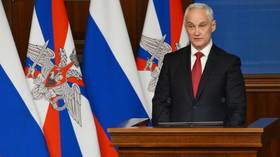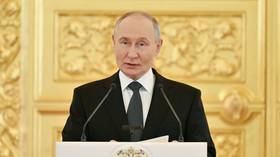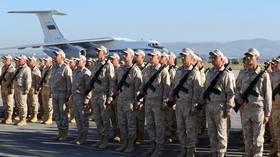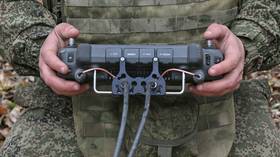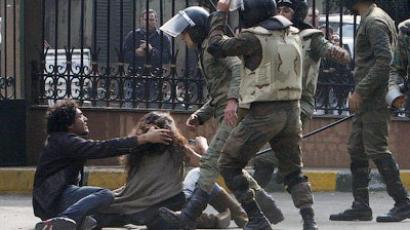One rule for Syria - but a different one for Egypt
The violence in Egypt continues, with at least 10 people killed and hundreds more injured in the last three days. However, unlike in Syria there is no talk of sanctions against the Egyptian military.
A shocking video of Egyptian soldiers cruelly beating a female protester came as fresh evidence of military brutality. The soldiers in full riot gear savagely beat a seemingly unconscious woman with sticks, kicking her and stamping on her chest. The excessive use of force by the military has sparked deep concerns from UN secretary-general Ban Ki-moon, who has called for the authorities to “act with restraint and to uphold human rights, including the right to peaceful protest.” The head of the Arab League has also expressed his deep regret at the violence. Nabil al-Arabi warned on Sunday that the clashes would push Egypt towards a state of chaos and a political and security vacuum.Middle East expert and author Tariq Ali told RT that the army is provoking public anger to create the impression the violence is coming not from them.“These disgusting things that have been done to demonstrators in Tahrir Square and on its fringes are bound to create a great deal of anger,” Ali said.“This really takes one back to the colonial period in Arab history and the history of that region when they were occupied by the British Empire,” the Middle East expert argues referring to the military’s tactics. “That is what they were taught to do.”However, despite the heavy-handed approach no one is talking about restraining the Egyptian military and imposing sanctions on them, Ali underlines, adding that the US is in fact giving them millions of dollars each year.“Why is there no talk of sanctions on Cairo, and yet massive pressure on Damascus?” he asks.“The sooner power is transferred to a civilian, elected, government the better – whatever that government may be,” he concluded.International relations professor Mark Almond pointed out the dire economic consequences that Egypt is facing in the wake of this violence.“It is a very dangerous situation because in addition to the violence that we have seen against people, there has also been severe destruction of buildings. The institute of historical research has seen its archive, which is not just of interest to scholars but is also symbolic of Egypt’s attraction to tourists because of its ancient heritage, largely destroyed by fire. So the economic consequences of this violence are very severe, because it is putting off tourist visitors from returning to Egypt.”


